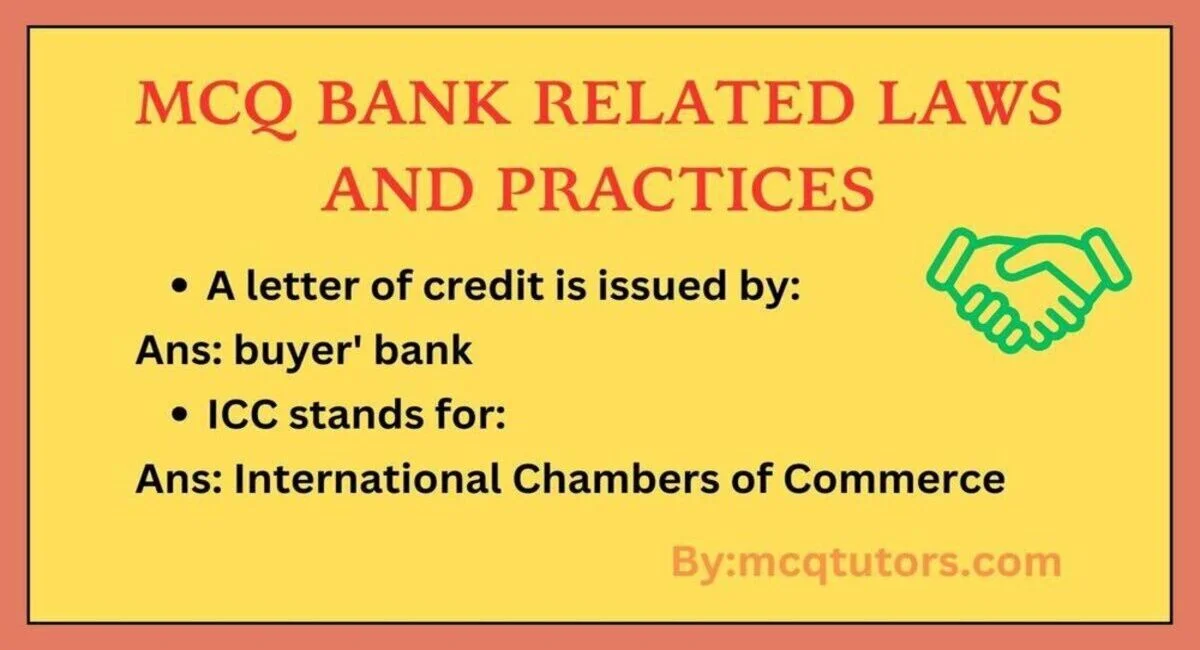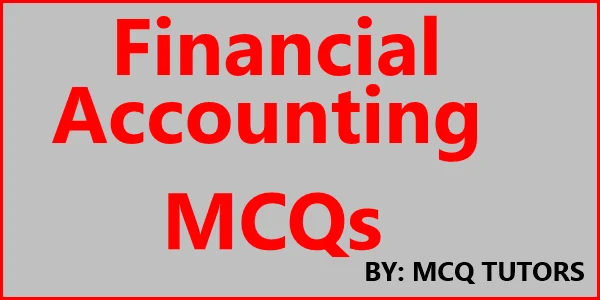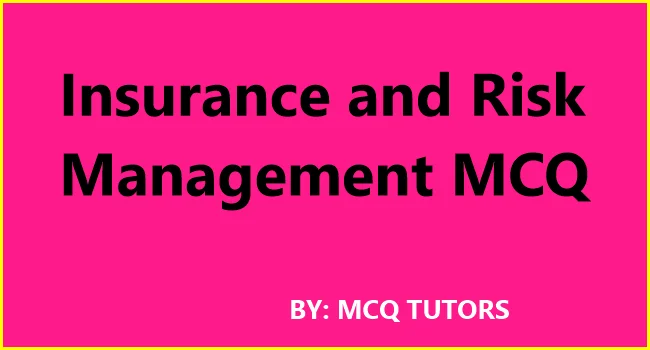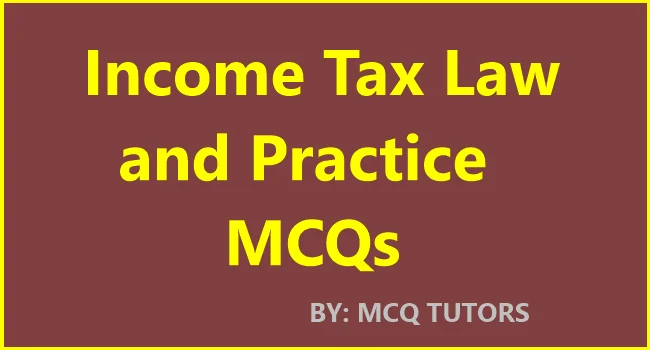Are you looking for Bank Related Laws and Practices MCQs download in pdf? This article provides an overview of the key rules and regulations governing banks and other financial institutions, as well as the practices they must follow.
It also offers a comprehensive list of MCQs (Multiple Choice Questions) related to this topic in an easily downloadable pdf format.
For those studying banking laws, this is an invaluable resource for mastering the legal frameworks and principles that are essential for a successful career in banking..

50 MCQ Bank Related Laws and Practices
1. which among the following is correct with regard to definition of ‘Banking” under the provisions of Banking regulations Act?
a. under section 5(b)
b. not defined
c. indirectly defined
d. not defined clearly
Ans. a
2. which of the following section defines ‘banking’ under the provision of Banking regulation Act?
a. section 5©
b. section 5(b)
c. section 5(e)
d. section 5(f)
Ans. b
3. The relationship between a customer who has deposited money with the bank and the banker is one of:
a. debtor and creditor
b. creditor and debtor
c. bailor and bailee
d. lessor and lessee
Ans. b
4. Section 31 deals with paying bank’s responsibilities under which act
a. BR Act
b. RBI Act
c. NI Act
d. CONTRACT Act
Ans. c
5. You receive a cheque for payment after the death of the customer
a. cheque will be paid irrespective of the death
b. cheque will not be paid as reliable information about the death of the customer has been received
c. cheque will be paid
d. cheue will be kept in abeyance.
Ans. b
6. A cheque is drawn by Ram on bank ‘B” favouring Dinesh. Who is the drawee of the cheque?
a. Ram
b. bank ‘B’
c. Dinesh
d. both (a) & (b)
Ans. b
7. A Cheque in fafour of Lord Rama or order is presented for payment.what will be your decision?
a. bank can pay
b. bank can reuse payment
c. It can be paid to the beneficiary or it can be credited to trust a/c in the name of Lord Rama
d. bank can pay to the presenter
Ans. c
8. One of the following statements is incorrect. Identify the same.
a. once a bearer always a bearer
b. drawer of the cheque is the customer
c. section 31 of NI act applies to all the parties to the cheque
d. section 85 of NI act deals with protection to the paying banker
Ans. c
9. Paying banker must refuse payment of the cheque when?
a. Insolvency petition against the customr has been received
b. order cheque has been issued by the customer
c. bearer cheque has been issued by the customer to his foe
d. an order cheque has been issued in favour of Lord Krishna
Ans. a
10. A letter of credit or documentary credit is a very common and familiar instrument used for:
a. settlements across the globe
b. trade settlements across the globe
c. dispute settlements across the globe
d. margin settlements across the globe
Ans. b
11. A documentary credit is defined in Uniform Customs and Practices for Documentary credit under :
a. article 22
b. article 21
c. article20
d. article2
Ans. d
12. A letter of credit is issued by:
a. seller’s bank
b. buyer’ bank
c. both buyer’s bank and seller’s bank
d. the Central bank of the country
Ans. b
13. ICC stands for:
a. International Clearance of Commerce
b. International Chambers of Council
c. International Chambers of Commerce
a. International Chambers of customs
Ans. c
14. UCPDC rules are framed by:
a. International Clearance of Commerce
b. International Chambers of Council
c. International Chambers of Commerce
d. International Chambers of customs
Ans.
15. UCPDC stand for:
a. Uniform Council and Practices for Documentary Credit
b. Uniform Customs and Procedures for Documentary Credit
c. Uniform Customs and Practices for Documentary Credit
d. Uniform Customs and Practices for Delayed Credit
Ans. c
16. ICC is headquartered in:
a. Basle
b. Frankfurt
c. Oslo
d. Paris
Ans. d
17. Reshipment Finance means:
a. Loan to exporter
b. Loan to exporter against shipment of goods already made and converted in the form of receivables
c. loan to arrange the shipment
d. loan to importer
Ans. a
18. In a Letter of Credit, the applicant is:
a. banker
b. importer
c. exporter
d. exporter’s bank
Ans. b
19. In a Letter of Credit the beneficiary is:
a. Importer
b. an exporter
c. Importer’s bank
d. opening bank
Ans. b
20. In a Letter of Credit, the exporter’s bank is known as:
a. opening bank
b. confirming bank
c. negotiating bank
d. issuing bank
Ans. c
21. Banks have been prohibited to staple the currency notes by RBI by issuing strict directives for implementation. Under which of the following, these directives have been issued?
a. section 35 A of Indian currency act
b. section 35 A of RBI act
c. section 35 A of NI act
d. section 35 A of Banking Regulation act
Ans. d
22. A’ branch has been opened by the bank recently and has been given ambitious targets for deposits and advances. It is approached by a chit fund company which is expected to deposit by means of an FD for Rs 10croresfor three years:
a. Bank will issue FDR, which will help in achieve the deposit target
b. Bank will issue FDR after RBI’s consent
c. Bank will not issue since RBI’s directives do not allow FDR in the name of Chit Company
d. Bank can issue deposit for one year
Ans. b
23. You receive a cheque for payment but the cheque neither bears the words ‘order’ or ‘bearer’: what will you do?
a. It will be treated a ‘bearer’ cheque and the payment will be made accordingly.
b. it will be treated as an order cheque and the payment will be made accordingly.
c. it will be treated as an ambiguous instrument and return the cheque.
d. it will be treated as an incomplete instrument and return the cheque.
Ans. b
24. A savings bank customer of your branch has issued a cheque which bears the words ‘order’ as well as ‘bearer’. What is your decision?
a. it will be treated as an ambiguous instrument and return the cheque.
b. it will be treated as an incomplete instrument and return the cheque.
c. it will be treated as an order cheque and the payment will be made accordingly.
d. It will be treated a ‘bearer’ cheque and the payment will be made accordingly.
Ans. d
25. Ms Asha a customer is having a savings bank a/c and her husband had withdrawn the money from the bank on the basis of forged cheques. She comes to the bank and demands the money.
a. bank will refer the matter to the court.
b. bank is negligent but not liable.
c. bank is liable
d. loss will be borne in ratio of 50:50 bases by the bank and customer
Ans. c
26. X issues a cheque in favour of Y and Z steals it. By forging Y’s signatures, he delivers it to W, who obtains the payment of the cheque from your branch. As a paying bank can u get protection?
a. yes under section 131 and 10
b. yes under section 85(1)
c. no it is forgery
d. no, not permitted under section 31
Ans. b
27. An award shall not be binding on a bank against which it is passed unless the complaint furnishes to it within a period of ___ days, and a ___ of the award in full and final acceptance.
a. 15, letter of acceptance
b. 30, letter of acceptance
c. 15, letter of agreement
d. 30, letter of agreement
Ans. a
28. A bank not agreeing to accept the Award passed under the scheme may file a ___ application before ___, within ___ month from the date of receipt of copy of the Award
a. review, disciplinary authority, one
b. review, review authority, two
c. review, review authority, one
d. review, disciplinary authority, two
Ans. c
29. What is the maximum compensation that a Banking Ombudsman can Award against the bank is limited to Rs ___ lakh and a bank not agreeing to accept the Award may file a review application before the review authority within a period ___ from the date of receipt of the Award.
a. no limit, 30 days
b. 1 million, 15 days
c. 1million, 30 days
d. 1 million, 45 days
Ans. c
30. ABC bank issued a bank guarantee and the validity period was mentioned as ’31 August 2008′ and the claim should be preferred within three months of the validity period. However the claim was preferred on 2 and December 2008. What should the banker do?
a. pays the claim as there is no information of fraud
b. pay the claim as it is preferred within the claim period
c. does not pay the claim amount as per the extant instructions
d. pays the claim and gets reimbursement
Ans. c
31. Prior to the amendment of Section 28 of the Indian contract act, most bank guarantees had a standard clause at the end of their guarantee period which states that the beneficiary was required to enforce :
a. within three months from the validity period
b. within six months from the validity period
c. within three to six months from the validity period
d. within six to nine months from the validity period
Ans. c
32. Sri Girdharilal opens a term deposit account with Universal Bank and nominates his niece Ms Rashmi. He expires in an accident but Ms Rashmi does not turn up even though a notice was sent from the bank. In the meantime, the legal heirs of Sri girdharilal, his two sons visit the bank and request the bank for making the payment of deposit. They also present a probate from court of law in which they are the executors of the will of the deceased. What is your decision?
a. the payment of the deposit will be made to legal heirs in terms of probate.
b. payment will be made to Ms Rashmi only.
c. payment will be made legal heirs and nominee in equal proportion
d. The bank wills advice the legal heirs to bring specific order from the court, in view of the nomination.
Ans. b
33. Your branch customer Mr Anil issues a cheque for Rs 15000/- in favour Mr krishana who endorses the cheque in favour of Vivek who misplaces the cheque. The cheque falls in the hands of Mr pal who forges the signature of Mr Vivek and obtains payment from the bank. Mr Anil and Mr Vivek request the bank to reverse the entry, as the payment has been made on the basis of forged endorsement:
a. bank is liable on the payment but will refuse the reversal of the entry.
b. bank is liable on the payment and will reverse the entry.
c. bank is responsible to Mr. Vivek
d. bank is not liable as the paying bank is protected against a forged endorsement
Ans. d
34. MR Karthik, your saving a bank customer issues a cheque, in favour of Mr Narayan who negotiates the cheque to Mr Ram. Branch receives the cheque in clearing for payment, but a notice of death of Mr Karthik is received. What will you do with this cheque?
a. cheque will be paid as Mr Naraan is alive
b. cheque will be returned.
c. cheque will be paid in normal course.
d. cheque will be paid on the indemnity of Mr Narayan
Ans. b
35. Mr Sundar, company secretary of M/S Surya software Limited which is having a current account with your branch,comes to your branch at 4.45 p.m. for encashment of a cheque ,issued by his colleague who maintains a savings bank account for Rs 4500/-.The Branch is normally closed by the bank for customer transactions by 3.00 p.m. He Mr Sundar insists for payment which is very urgently needed by him as he has to precede to Delhi the same evening. How will you accommodate the payee?
a. the cheque can be paid as this is not only a small amount, but to an employee of a known company.
b. the cheque cannot be paid after close of business hours.
c. the cheque can be paid
d. the cheque if paid will be entered in the branch records next day by following the usual procedure.
Ans. c
36. Mr A, a shop keeper took a fire insurance policy for his godown from an insurance company, which undertakes to pay a certain amount to the policy holder in the event of a fire in the godown and subject to the condition of the policy and payment of premium by the shop keeper. Such a type of policy is not dealt under section 124 of the Contract Act. Such contracts are classified as:
a. contract of guarantee
b. contract of Indemnity
c. contract of hypothecation
d. contract of lien
Ans. b
37. Mr Ganesh was he holder of Government promissory note which he had handed over to Mr Avinash, his broker.MR Avinash forged Mr Ganesh’s signature and endorsed it for value to the bank. The bank in good faith applied to the Government Public Debt Office to have the note exchanged in their name which was complied with. Mr Ganesh on coming to know that he has been defrauded sued the Government against the loss suffered by him. The court’s decision would be :
a. bank is not liable as there is no contract between the bank and Mr Ganesh
b. Mr Avinash is liable to pay the loss suffered by Mr Ganesh
c. bank is liable on the grounds that the bank is responsible for an injury to a third party’s rights.
d. Government is liable since it should have verified the signature.
Ans. c
38. You receive information about the death of a depositor of your branch through his nominee, who comes to get the payment of the deposit. At that time the legal heirs of the deceased also approach the bank for payment of the deposit amount. In this connection the legal heirs hand over a copy of the plaint, for a court case filed by them to get succession certificate:
a. payment shall not be made till the dispute is settled.
b. payment will be made to legal heirs and nominee in equal ratio.
c. payment will be made to legal heirs only.
d. payment will be made to the nominee only.
Ans. d
39. Banking Ombudsman has jurisdiction to redress the disputes between one bank and the other. (True/False)
Ans. True
40. Selection committee for Banking Ombudsman is constituted by the Government of India. (True/False)
Ans. False
41. The maximum age limit for a Banking Ombudsman is 60 years. (True/False)
Ans. False
42. The office of Banking Ombudsman can be removed by the Governor of Reserve Bank. (True/False)
Ans. True
43. Customers have to make complaint to Banking Ombudsman only through the concerned bank branch. (True/False)
Ans. False
44. It is not the function of Banking Ombudsman to try for settlement between the bank and the constituent through conciliation or mediation. (True/False)
Ans. False
45. If the complaint is not settled within one month from the date of receipt of notice, Banking Ombudsman will refer the matter to the Reserve Bank for the final disposal. (True/False)
Ans. False
46. Even non customers can file complaints against a bank with respect to deficiency in service before the Banking Ombudsman. (True/False)
Ans. False
47. There is no provision for filing complaint against a bank for not sanctioning a loan. (True/False)
Ans. True
48. Complaint to Banking Ombudsman can be made by an advocate. (True/False)
Ans. False
49. The customer cannot file the complaint before Banking Ombudsman after one year from the date on which the cause of action arose. (True/False)
Ans. True
50. The complaint to Banking Ombudsman cannot pertain to the same matter that is before any court or tribunal. (True/False)
Ans. True
Do you know what is Treasury Management in Banks?
Conclusion:
Bank Related Laws and Practices MCQs download in pdf is a great way to prepare for exams. It provides students with an opportunity to practice their skills, test their knowledge, and increase their understanding of the material.
Furthermore, accessing the resources online makes it easy to access bank related laws and practices from anywhere with an internet connection.
Read More MCQs



